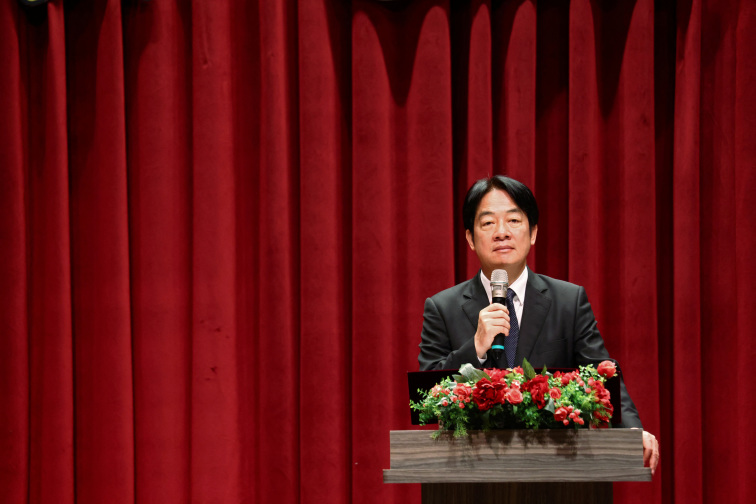After multiple Chinese sanitary pad brands were revealed to have quality issues, a large number of Chinese consumers flocked to local Japanese stores to buy sanitary pads. Some Japanese stores have implemented purchase limits, but shortages have still been reported in certain locations. (Screenshot from webpage)
[People News] China's "sanitary pad chaos," which began in November, continues to persist. Numerous sanitary pad brands have been exposed for falsely advertising their product lengths, taking advantage of lenient national regulatory standards, and raising concerns over the use of substandard cotton. These issues have caused a dramatic collapse in consumer trust for this essential daily product. The situation has sparked a wave of "nationwide reviews" and calls for the creation of new brands and stricter regulatory measures as part of a "self-rescue effort."
According to Voice of America, several Chinese sanitary pad brands have recently come under scrutiny for problems such as falsely labeled lengths, drawing widespread public attention. The Weibo hashtag "sanitary pad scandal" has trended, garnering over 170 million views.
The education blogger "Pure Wanshiya" from Fujian posted, "When it comes to women's products, I truly feel that China's business environment overly favors enterprises, to the extent that they've become reckless and brazen. From product development and quality to marketing and public relations, everything carries a strange undertone. … Companies are putting all their effort into packaging, cutting costs and improving efficiency at the expense of consumers' wallets."
The reading blogger "Yishan Jin Yu" from Jilin criticized, "With no regulation from above, those capitalists quickly realized that sanitary pads are a blue ocean market—low cost, high demand, and they can rake in profits just by throwing around a few slogans about independent women."
A customer service response on the official website of the well-known brand ABC, stating, "If you can't accept it, you don't have to buy it," sparked public outrage. On November 22, ABC's founder, Deng Jingheng, was forced to issue a video apology to the public.
Loose Regulatory Standards
After the sanitary pad quality scandal, some female consumers began closely examining the products they use. Their primary concerns include whether manufacturers are cutting corners, using "black-hearted cotton" (containing insect eggs or fluorescent agents), and other quality issues. Media reports have previously mentioned consumers finding needles and insect eggs in sanitary pads.
Currently, sanitary pads sold in the Chinese market are subject to two national standards: A recommended national standard implemented on July 1, 2019, which regulates specifications such as sanitary pad length deviation, absorbency rate, pH levels, and packaging labels. A mandatory national standard implemented on September 1, 2002, which governs sanitary conditions in production environments, toxicological testing requirements, and similar aspects for disposable hygiene products.
Some consumers criticize these standards as being too lenient. For example, the recommended standard allows a length deviation of ±4% and pH values between 4.0 and 9.0—equivalent to the standards for C-grade textiles like curtains, which do not come into direct contact with skin. By comparison, infant textiles must meet A-grade standards, while textiles in direct contact with skin fall under B-grade.
Why the Strong Reaction This Time?
Royi, founder of the Guangdong-based sanitary pad brand "Pink Knight," expressed frustration over the "sanitary pad chaos."
In a written response to Voice of America, she explained: "From what I’ve learned from agents, raw material suppliers for sanitary pads in China are monopolized. However, companies have the choice to use either low-cost or high-cost materials based on their conscience. The issue with pad length can be resolved by paying for a custom mold, though this increases production costs. It’s not impossible to achieve higher standards—it’s just a matter of balancing costs and profits."
Royi noted that quality issues in Chinese sanitary pads are not new. The intense backlash this time stems from several factors: The wide scope of the issue, particularly the collapse of trust in well-known brands. The amplification of consumer dissatisfaction through social media, which created public pressure and heightened awareness of the potential harm sanitary pads could pose. The growing focus on women’s rights issues, as many bloggers pointed out that women’s products are not only poorly made but also pose safety risks. Additionally, comparable products for men, such as incontinence pads, are often better designed, safer, and more affordable.
Royi added that 60% of sanitary pad brands participated in drafting the national standards, yet major brands maximize cost-cutting practices within the permissible limits of these standards, further fueling consumer perceptions of profit-driven exploitation.
Having studied in Australia for five years, she believes that, given the ongoing issues with women’s essential products in China, it’s crucial to adopt regulatory practices similar to Australia’s. She has since launched her own business to create affordable and reliable sanitary pads, saying, “If the market won’t change, I’ll change the market myself.”
Female Consumers' Sense of Powerlessness Over the "Sanitary Pad Chaos"
Interviews by Voice of America reveal that some consumers feel powerless in the face of the "sanitary pad chaos."
Ms. Fang, a Shanghai resident who wished to remain anonymous due to the sensitivity of the topic, bluntly stated that she is not concerned about the aftermath of the incident. She explained, "In China, when public anger reaches a certain level, local government agencies issue blue-background white-text statements saying, 'We are conducting strict investigations' or 'We will punish after verification.'"
Ms. Chen, when asked whether sanitary pad manufacturers should be held accountable, expressed helplessness. She said, "China is not like Taiwan—brands, distributors, and even government regulatory agencies only apologize when public outrage becomes significant."
She told Voice of America, "Sanitary pads are a necessity, and brands are not afraid of reputational damage or loss of sales. With such a large population, there will always be people buying their products. These issues feel distant from us—we have no control over manufacturers, government, or regulatory bodies, so consumers end up being inactive like this."
Ms. Han, a resident of Shenzhen, said she was aware of the sanitary pad issue but admitted, "I didn’t pay much attention because I feel there’s nothing I can do about it."
Royi, the founder of the "Pink Knight" sanitary pad brand, believes that consumers have long lacked channels for making meaningful change. Often, quality scandals fade away without resolution, leaving consumers feeling powerless. She also pointed out the lack of female voices and leadership in areas affecting women’s health, resulting in insufficient attention to women’s needs and rights.
Royi urged consumers to strengthen their awareness of their rights by contributing suggestions to the "new national standards" and supporting brands that prioritize higher standards and health. She emphasized the importance of using purchasing power to make a statement. She also called on regulatory bodies to strengthen inspections of sanitary pad raw materials and production processes, provide authoritative product testing results, rebuild consumer trust through transparency, and impose clear penalties on non-compliant manufacturers.
Grassroots Efforts: Social Media Reviews and "New National Standards" Movement
On social media, many bloggers have initiated self-led efforts to "rescue" themselves, publishing various "red and black lists" of sanitary pad brands.
A popular Xiaohongshu science blogger from Xi’an, "Hui Ge's Ultra-Serious Reviews," conducted self-funded tests on 56 sanitary pad brands. Using sanitary pad standards, they measured dimensions and dissected the inner materials. While no "black-hearted cotton" was detected, some brands were indeed found to fall short of the stated dimensions.
Meanwhile, Shaanxi-based feminist blogger "She Breathes" launched a "Sanitary Pad New National Standards" initiative. She urged people to submit feedback through the "National Standard Full Text Disclosure System," addressing issues like length deviations, strip weight inconsistencies, and absorbency rates. She also provided references for technical parameters on heavy metals, formaldehyde content, and pH values, advocating for mandatory standards. These include narrowing permissible deviations, improving design, and increasing penalties for non-compliance.
Nationwide Reviews Reflect a Collapse of Trust
An article published by the Economic Observer on November 30 noted that fast-moving consumer goods like sanitary pads, compared to high-priced, highly competitive, and highly scrutinized 3C (computer, communication, and consumer electronics) products, have long lacked a robust ecosystem of product evaluations.
"The current phenomenon of nationwide reviews of sanitary pads reflects a collapse of trust, not a healthy market ecosystem," the article stated.
The article pointed out that some consumers are attempting to publish "civilian sanitary pad brand red-and-black lists" through grassroots reviews. However, almost no brands have qualified for the "red list."
The China Consumers Association released its 2024 "Double 11" Consumer Rights Public Opinion Analysis Report on November 28. The report highlighted that during the monitoring period, negative information about "product quality" was concentrated on multiple sanitary pad brands, specifically concerning the actual length being shorter than the length indicated on the packaging. Discussions about and exposure of raw materials further fueled consumer skepticism.
A review conducted by The Paper on 24 sanitary pad products revealed that while all met national standards, only two products matched their stated length, and 88% were shorter than advertised.











News magazine bootstrap themes!
I like this themes, fast loading and look profesional
Thank you Carlos!
You're welcome!
Please support me with give positive rating!
Yes Sure!